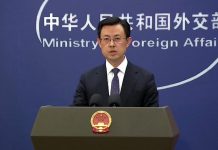BANGKOK (AP) — Police investigating last month’s Bangkok bombing said Wednesday that the fingerprints of a foreign man arrested at the Thai-Cambodia border match those found on a bottle of bomb-making material, and that they were seeking to arrest a Turkish man linked to the blast.
The new suspect, identified as Emrah Davutoglu, is the husband of a Thai woman for whom an arrest warrant has already been issued because she had
rented an apartment where bomb-making materials were found this past weekend. The woman professes innocence and says she is in Turkey. Of the eight people for whom arrest warrants have now been issued, at least two others are also believed to be Turkish.
 This image released on Wednesday, Sept. 2, 2015, shows Emrah Davutoglu from Turkey, who police said faces “charges of conspiracy to possess unauthorized war materials”. (Royal Thai Police via AP)
This image released on Wednesday, Sept. 2, 2015, shows Emrah Davutoglu from Turkey, who police said faces “charges of conspiracy to possess unauthorized war materials”. (Royal Thai Police via AP)
National police spokesman Prawut Thavornsiri said authorities were still conducting DNA tests but could determine that the man arrested at the Cambodian border “is important and is related or conspired with people who committed” the Aug. 17 bombing at the Erawan Shrine in central Bangkok. The blast left 20 people dead, more than half of them foreigners, and over 120 injured.
Thailand’s national deputy police chief, Chakthip Chaijinda, told reporters that he thinks the suspect arrested at the border speaks Turkish, which requires an interpreter. He did not say whether an interpreter has been brought in or if the Turkish Embassy has been approached.
The Turkish connection has fueled speculation the suspects may be part of a group seeking to avenge Thailand’s forced repatriation of ethnic Uighurs to China in July.
Uighurs (pronounced WEE-gurs) are related to Turks, and Turkey is home to a large Uighur community. The Erawan Shrine is especially popular with Chinese tourists, feeding the idea that it could be a target for people who believe the Uighurs are oppressed by China’s government. Beijing says some Uighurs are Islamist terrorists, and that among them is a group that has been smuggled out of China to join Islamic State fighters in Syria.
In a later announcement, Prawut said Davutoglu faces charges of conspiracy to possess unauthorized war materials. Prawut said he is believed to have been “part of a network that provided accommodation” to those connected with the bombing.
Earlier this week, police issued an arrest warrant for his wife, Thai national Wanna Suansan, whose name was on the lease of an apartment that police raided over the weekend where bomb-making materials were found. Wanna had told police that she had nothing to do with the bombing and wants to clear her name. Prawut said that Wanna had agreed to come back to Thailand to be questioned by police but then said “she has to think about it.”
The investigation into the attack picked up after police raids this past weekend on two apartments on the outskirts of Bangkok that contained bomb-making materials.
In the first apartment, raided Saturday in the Bangkok neighborhood of Nong Chok, police arrested a suspect they described as a foreign man and seized bomb-making equipment that included detonators, ball bearings and a metal pipe believed to be a bomb casing. The suspect arrested Saturday had a Turkish passport, though Thai authorities say it was fake. At his apartment, they seized more than 200 passports, an unknown number of which appeared to be Turkish and possibly fake.
They also took fingerprints from the apartment, which turned out to match those of the suspect arrested Tuesday at the border with Cambodia, Prawut said.
“We can confirm that the man’s fingerprints match with those found on a bottle that contains a bombing substance,” Prawut said, and then added, “He could be the one who brought the bomb out of this apartment or he could have brought the bomb to the crime scene.”
Prawut said that further testing, including DNA tests, were being conducted to bolster that theory.
Both suspects who have been arrested are being interrogated by the military and have not yet been formally charged.
When authorities announced the arrest Tuesday of the suspect at the border, they described him as bearing resemblance to a man spotted in surveillance video at the shrine who is believed to have planted the bomb. The suspect seen in the video, wearing a yellow T-shirt, is carrying a backpack that he places on a bench before leaving. Prime Minister Prayuth told reporters that the arrested man was a foreigner who appeared to be trying to escape across the border.
The prime minister said officials knew from their investigation that people involved in the bombing were about to flee the country and had traced one of the suspects to Aranyaprathet district in Sa Kaeo province, a crossing point to Cambodia. He described the arrested man as a piece in a jigsaw puzzle that would connect various parts of the case, which included a bomb that exploded harmlessly in a river next to a busy pier in Bangkok the day after the shrine blast.
The blast at the Erawan Shrine was unprecedented in the Thai capital, where smaller bombs have been employed in domestic political violence over the past decade, but not in an effort to cause large-scale casualties.
Copyright 2015 The Associated Press. All rights reserved. This material may not be published, broadcast, rewritten or redistributed.




